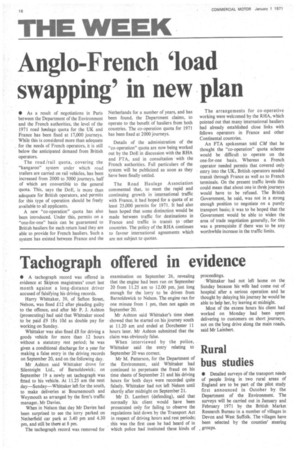Anglo-French 'load swapping' in new plan
Page 18

If you've noticed an error in this article please click here to report it so we can fix it.
• As a result of negotiations in Paris between the Department of the Environment and the French authorities, the level of the 1971 road haulage quota for the UK and France has been fixed at 17,000 journeys. While this is considered more than adequate for the needs of French operators, it is still below the anticipated demand from British operators.
The road /rail quota, covering the "kangaroo" system under which road trailers are carried on rail vehicles, has been increased from 2000 to 3000 journeys, half of which are convertible to the general quota. This, says the DoE, is more than adequate for British operators, and permits for this type of operation should be freely available to all applicants.
A new "co-operation" quota has also been introduced. Under this, permits on a "one-for-one" basis can be guaranteed to British hauliers for each return load they are able to provide for French hauliers. Such a system has existed between France and the Netherlands for a number of years, and has been found, the Department claims, to operate to the benefit of hauliers from both countries. The co-operation quota for 1971 has been fixed at 2000 journeys.
Details of the administration of the "co-operation" quota are now being worked out by the DoE in discussion with the RHA and FTA, and in consultation with the French authorities. Full particulars of the system will be publicized as soon as they have been finally settled.
The Road Haulage Association commented that, to meet the rapid and continuing growth in international traffic with France, it had hoped for a quota of at least 25,000 permits for 1971. It had also been hoped that some distinction would be made between traffic for destinations in France and traffic in transit to other countries. The policy of the RHA continues to favour international agreements which are not subject to quotas. The arrangements for co-operative working were welcomed by the RHA, which pointed out that many international hauliers had already established close links with fellows operators in France and other Continental countries.
An PTA spokesman told CM that he thought the "co-operation" quota scheme would be difficult to operate on the one-for-one basis. Whereas a French operator needed permits that covered only entry into the UK, British operators needed transit through France as well as to French terminals. On the present traffic levels this could mean that about one in thrde journeys would have to be refused. The British Government, he said, was not in a strong enough position to negotiate on a purely transport basis; it was to be hoped that the Government would be able to widen the area of trade negotiation generally, for this was a prerequisite if there was to be any worthwhile increase in the traffic limits.




















































































